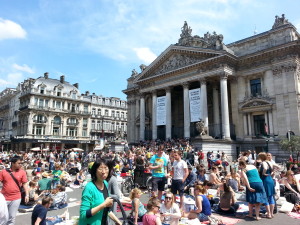Ambition, innovation and flexibility (see my previous op-ed in the Letters from America series entitled “Where the sky is the limit”) also characterize the US when it comes to politics, including international politics. In this op-ed I focus on the role of the US on the global stage and compare it with that of the EU, to the extent that the two are comparable.
In the post-World War II world the US has been the undisputable leader most of the time, certainly in the West. Its predominance may have been challenged by the Soviet Union during the Cold War, but its ultimate triumph and the dissolution of the Soviet bloc confirmed the superiority of the US. At the one universal organization, the United Nations (UN), the US occupies one of five permanent seats with veto power. There and beyond its superiority in terms of hard (military, economic, political) and soft (cultural, innovation-al) power, its social and administrative cohesion and drive for achievement distinguish it from the emerging superpower of China, a defensive Russia, and the long-declining former colonial powers of France and the UK.
A European patriot, if one exists, would rejoice in the fact of EU “double occupancy” at the core of the UN Security Council. Caution is in order, though. While the US is a unitary actor, to the extent that is possible for such a complex state, the UK and France certainly do not want to surrender their Security Council prerogatives to any joint EU decision-making. To make things worse, among the elected ten members of the Security Council at least one and often two are also EU members. Four votes out of fifteen? That would be a great deal for the EU. Well, forget it, it is four different sets of policies and interests, no matter what lip service is paid to the EU’s Common Foreign and Security Policy (CFSP). Of course, interests often coincide and that is reflected in frequently concurring European votes. That, however, is not part of really joint strategic planning that involves the European institutions. Let the High Representative for Foreign Affairs and Security Policy, these days Ms. Mogherini, say what she wants; the ultimate interests are defined at the national level by the corresponding national elites.
While the US formulates strategies through its National Security Council and its Departments of State, Defence, Treasury, Energy, etc., the EU struggles to formulate common positions through protracted negotiations of its 28 member states, plus the European Commission and the European External Action Service (EEAS, headed by the High Representative). By the time the Europeans have managed to reach agreement among themselves in the margins of UN negotiation processes the other countries of the world have moved on, with the European position having less of the impact that it could have.
European money is welcomed for development and humanitarian assistance by a large part of the world, but no leadership is expected or sought from the EU. The standard leader and trend-setter remains the US, whether loved or resented. Increasingly, China is emerging as a leader too, individually or in the context of groups that it belongs to, notably the Group of 77 and the BRICS. A “dual hegemony” thus seems to be taking shape at the global level, with the US and China as the two leading powers, the “G2”. One would expect that the other emerging power, the EU, with its more than 500 million inhabitants (the US population is about 320 million) and the biggest economy collectively in the world, to be part of the core group, part of a “G3”, but that is not the case.
One would expect the EU, with its more than 500 million inhabitants and the biggest economy collectively in the world, to be part of a “G3” of leading global powers, together with the US and China, but that is not the case.
In fact, this is not the case even on climate change, where the EU is broadly acknowledged to be taking bold steps. The large greenhouse gas emission reduction targets for 2030 announced by the EU in October 2014 were less imagination-grabbing and relevant to global policy than the joint November 2014 announcement by the US and China of their corresponding, more modest but coordinated measures. Discreet but targeted actions taken in tandem by the G2 also played a major role in saving the recent UN climate change conference in Lima (December 2014), compared to a respected but rather marginal role played by the EU.
It should be pointed out, in all fairness, that individual EU states like the UK or the Nordic countries often demonstrate more leadership and have more impact than the EU as a whole, despite their limited resources. These countries, however, operate in a second or third tier around the US, China and even other major developing or middle-income countries, when acting alone. A core problem for the EU is that there is no defined common European interest, and actually no effort is being made to define it in a strategic way for the medium and long-term beyond declaratory generalities. Not that such an exercise is “a piece of cake” for the US, which has its own internal divisions and dysfunctional elements. In the case of the US, though, there is enough common discussion, vision and empowered central institutions that make rational planning possible and mobilize sufficient resources to execute it.
The clarity of the US interest in the case of its partnerships over the Atlantic and Pacific Oceans, from NATO to APEC, as well as in the “Western Hemisphere” (i.e. the Americas), leads to concrete political and economic outcomes. The same cannot necessarily be said for the EU’s policies towards its immediate neighbourhood, which manage to be at the same time intrusive when it comes to the details (strict adoption of the “acquis communautaire”) and politically disjointed on the big picture (see mishandling of Ukrainian case vis-à-vis the country’s internal divisions and Russia).
It should come as no surprise that EU members are steadily losing ground on the charts of state power and influence in the world, overtaken by more dynamic, emerging powers.
The EU’s central institutions seem to be stuck to what 19th Century Europe identified as “mission civilisatrice”, fuelled by an underlying sense of self-righteousness and superiority vis-à-vis others, while individual member states continue to pursue their narrow but concrete geopolitical and economic interests, which go in different directions. With all this, it should come as no surprise that EU members are steadily losing ground on the charts of state power and influence in the world, overtaken by more dynamic, emerging powers. Of course, the US steadily maintains one of the top posts, as would the EU as a whole, should it become really united.
Georgios Kostakos
Originally published as op-ed in Katoikos.eu on 4 February 2015





